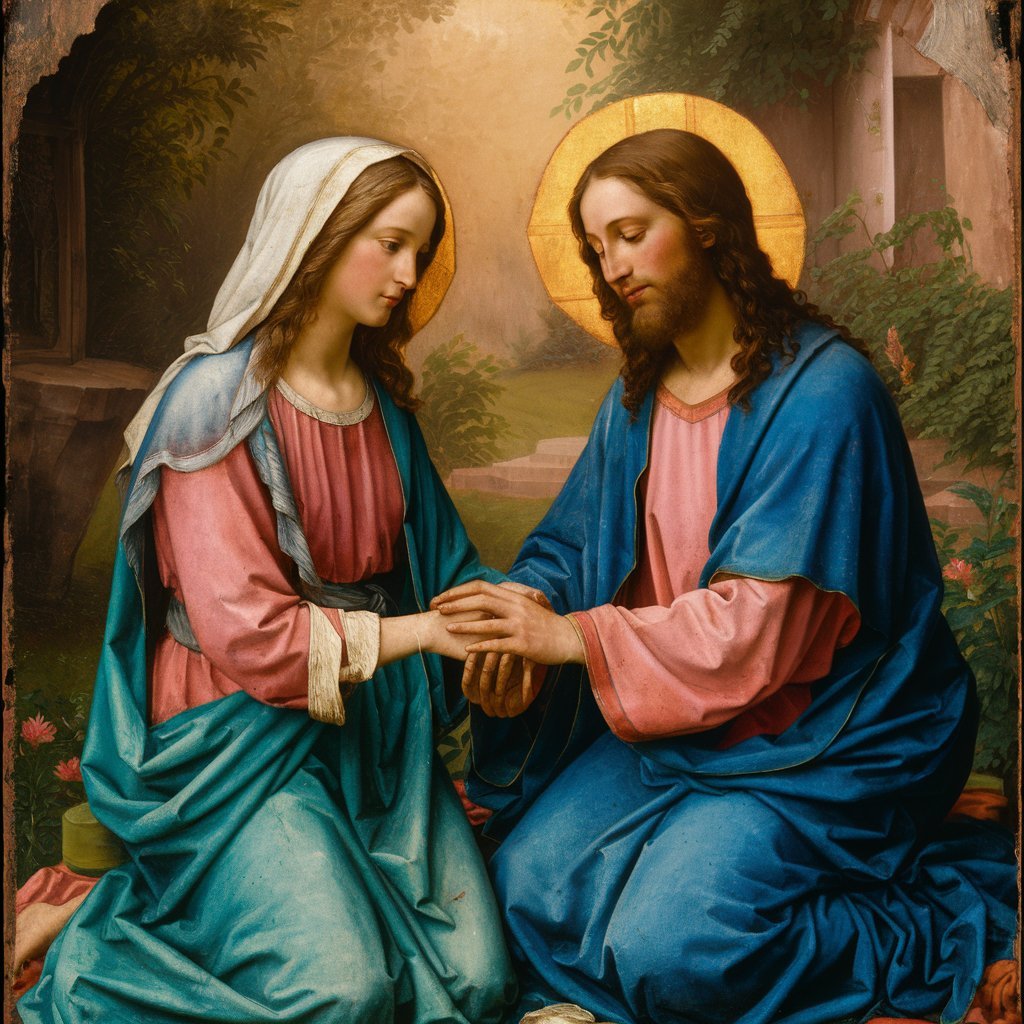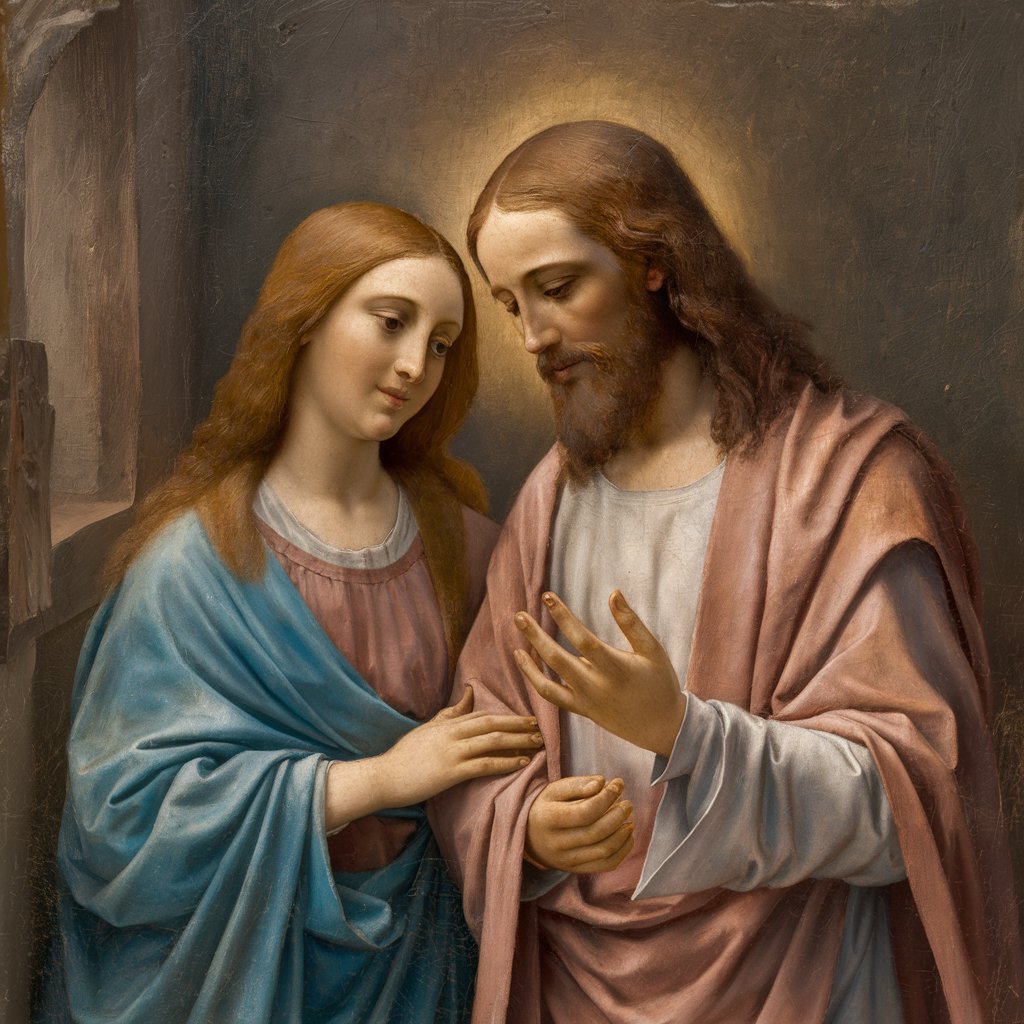
Was Jesus Christ married? Why do some people believe he had a wife?
In the books that recount the life of Jesus Christ, there is no evidence of His marriage. Let’s take a look at the singleness of Jesus Christ and the various theories about potential spouses and marriage.
The recent discovery and translation of a 4th-century document known as the ‘Jesus’ Wife Papyrus’ has sparked debate about whether Jesus was married or had a wife. This papyrus includes a quote attributed to Jesus saying, ‘my wife…’. The Gospel of Jesus’ Wife is likely a forged Coptic papyrus fragment that includes the phrase ‘Jesus said to them, my wife…’. When it was first published in 2012, it garnered widespread attention due to the implication that some early Christians believed Jesus was married.
This finding is particularly interesting because it is the first known Gnostic writing that explicitly claims Jesus had a wife. Although some Gnostic gospels reference a close relationship between Jesus and Mary Magdalene, none specifically state that He married her or anyone else. However, the authenticity of the ‘Jesus’ Wife Papyrus’ and the Gnostic gospels is highly disputed, with many experts believing they are forgeries created to promote a particular Gnostic interpretation of Jesus. Despite this, it is important to note that these documents hold no credibility and should not be accepted as evidence.
Nevertheless, some people believe and teach that Jesus Christ was married. However, this is not mentioned anywhere in the Bible. If Jesus had indeed been married, there would have been a clear indication of this in the Bible. The Bible mentions many of Jesus’ family members, including His mother Mary, His foster father Joseph, His half-brothers, and half-sisters. Therefore, it is unlikely that the Bible would have omitted such an important detail about Jesus’ life.
Those who believe that Jesus Christ was married do so because they want to make Him more relatable and human-like. They do not want to accept that Jesus was fully God and fully human (as mentioned in John 1:1, 1:14, and 10:30). Instead, they create and believe myths about Jesus having a wife, children, and living an ordinary human life.
Read More : What is the significance of the name Jesus Christ to us?
فرست محتوا
Was Jesus Christ Married?
In the books that provide the history of Jesus Christ’s life, there is no evidence of His marriage. Therefore, anything that suggests Jesus was married is merely speculation and is usually proposed by those who intend to alter the biblical records and add something to them. Thus, anyone who claims that Jesus was married is merely fabricating this. There is no documentation of this in any historical report or the Bible.
Now, we must be careful not to go too far and say that because Jesus Christ was unmarried, marriage or sexuality is automatically somehow sinful. Jesus’ disciples were married. Jesus was at a stage in life where He left everything to fulfill the purposes of His Father. Therefore, we have no evidence that He desired or had a marriage, or that part of His ministry included marriage. This does not mean that marriage or sexuality is wrong, which sometimes takes the line too far by using His marital status as a statement about marriage, which would be inappropriate.
Evidence Suggesting Jesus Christ Was Married
‘Raymond Brown, a Roman Catholic scholar, wrote nearly three decades ago: “It is a sad insight into human nature that the more sensational a scenario, the more sensational its promotion, and the more temporary interest it attracts.” People who never bother to read a responsible analysis of the traditions surrounding the crucifixion, death, burial, and resurrection of Jesus Christ are captivated by reports of some “new insights” that He was not crucified or did not die, especially if the continuation of His work includes escaping to India with Mary Magdalene.’
This shameful aspect of human nature has once again been put on full display on television screens and in news headlines. A Harvard scholar has presented a piece of papyrus allegedly copied about three centuries after the life of Jesus Christ, containing the phrase: “Jesus said to them, my wife.” The news media reacted as if these five Coptic words suddenly rewrote the entire field of biblical studies.
Public Radio International suggested that this fragment might challenge ‘hundreds of years of religious belief’ by reigniting ‘the centuries-old debate over the role of women in Christianity’. (Never mind that this fragment gives us little, if any, information about the role of women in Christianity, or that this debate hardly needs reigniting—it has remained quite ignited for a long time.)
According to Bloomberg Businessweek, ‘Evidence that Jesus Christ was married or had female disciples could have ripple effects on current discussions about the role of women.’ (Never mind that the New Testament is full of examples of female disciples and their existence has never been questioned.) The Washington Post claimed that this papyrus has reopened debates on ‘scholarship focused on Jesus’ marital status and the authenticity of early church texts.’ (I’m not sure what this fragment has to do with the authenticity of early Christian texts; what it has to do with Jesus’ historical marital status is, as it turns out, practically nothing.)
Dr. Karen King—the scholar who presented this fragment at the International Congress of Coptic Studies—admitted to her credit that this fragment ‘does not provide evidence that the historical Jesus was married.’ At the same time, her decision to name this fragment the ‘Gospel of Jesus’ Wife’ was not exactly conducive to reasoned debate.
Other scholars had already raised legitimate questions about the authenticity of this fragment, as well as noted irregularities in the way the research was published. This furor will soon die down, likely with the revelation that this fragment was a forgery in the first place.
Nevertheless, the publicity may have raised one or two legitimate questions in the minds of Christians and others—questions like, ‘Why do Christians assume that Jesus Christ was unmarried? And would it have mattered if He was?’ With this in mind, let’s take a quick look at the earliest historical traditions regarding Christ’s marital status.
The History of Jesus Christ’s Relationships
Dr. King has presented what she has termed the ‘Gospel of Jesus’ Wife’ as evidence that debates over Jesus Christ’s singleness were an urgent issue among second-century Christians. According to King, this fragment provides ‘direct evidence’ that ‘claims about Jesus’ marital status first arose over a century after Jesus’ death in the context of intra-Christian debates over sexuality, marriage, and discipleship.’ In other words, second-century Christians were arguing about issues of sex and marriage. Amid these debates, some Christians claimed that Jesus was married while others said He was not.
Looking at second- and third-century sources, I’m not so sure. In the first place, although it’s possible, it’s not certain that the fourth-century fragment known as the Gospel of Jesus’ Wife was translated from any second-century text. Moreover, Coptic texts of this type did not emerge in the context of ‘intra-Christian debates’; they originated from breakaway Gnostic sects. These groups had rejected the apostolic eyewitness testimony. The Gnostics’ primary concern was not whether Jesus had actually been married, but how they could depict Jesus in a way that reflected their myths and rituals.
So what do the earliest Christian references to Jesus Christ and marriage say? Do they indicate ‘sharp intra-Christian divisions’ that led to ‘competing claims about Jesus’ marital status’?
Not really.
In fact, in the earliest Christian references to Jesus Christ’s marital status, I see no indication of competing claims over whether Jesus Christ was married or single.
The earliest Christian writer to explicitly mention Jesus Christ’s singleness seems to have been Clement of Alexandria. Clement was a theologian who began teaching in Alexandria around A.D. 180. In the late second century, Clement wrote against false teachers who had made marriage taboo; these false teachers had claimed that ‘marriage is the same as sexual immorality.’ While arguing against these heretics, Clement stated that Jesus ‘did not marry’ (Stromata 3:6:49).
What’s noteworthy in all of these sources is that none of the writers seem to feel they need to defend Jesus’ singleness. Both Clement and Tertullian, in treatises that are focused on other subjects, mention this status in passing, as if they and their readers took Jesus’ singleness for granted.

Jesus Christ and Mary Magdalene
The only potential evidence for alternative views about Jesus Christ’s marital status seems to offer little or no real evidence at all. The Gospel of Mary—a text that probably originated in a Gnostic context around the time of Tertullian, long after the death of all the eyewitnesses of Jesus—simply mentions that Jesus ‘loved Mary more’ than other women (10).
The Gospel of Philip appears to have been written a bit later, in the first half of the third century. The Gospel of Philip describes a secret initiation ritual called the ‘bridal chamber’ through which spiritual secrets were passed from one person to another in a Gnostic sect called the Valentinians (Gospel of Philip 67). As such, much of the language in the book is symbolic in the first place. According to this text, Jesus ‘kissed Mary Magdalene’ (63–64). A small hole appears after the word translated as ‘kissed’ in the manuscript. As such, it is impossible to know where or how Jesus supposedly kissed Mary.
In a culture where kissing functioned as a standard greeting (Acts 20:37; Romans 16:16; 1 Corinthians 16:20; 2 Corinthians 13:12; 1 Thessalonians 5:26; 1 Peter 5:14), a kiss indicated close friendship—not necessarily, or even primarily, a marital connection. The Gospel of Philip also calls Mary Magdalene Jesus’ ‘companion,’ to whom He was ‘joined’ (59).
The term translated as ‘companion’ is a Coptic derivative of the Greek word koinonos. However, contrary to King’s suggestion, koinonos doesn’t necessarily carry any sexual connotations. Instead, the term indicates the existence of a close, emotional bond. Even in later Gnostic interpretations, this bond could remain entirely platonic.
It is interesting to note that neither the Gospel of Mary nor the Gospel of Philip claims that Jesus Christ was married to Mary Magdalene.
Is There Evidence of Jesus Christ’s Marriage in the Bible?
None of the canonical Gospels mentions that Jesus Christ was married. In fact, there is strong evidence to the contrary. Matthew 19:10–12 and 1 Corinthians 9:5 both suggest that Jesus was single. These passages have been read as suggesting that Jesus was an ascetic, celibate for the sake of the kingdom of heaven.
Some argue that it would have been ‘unusual’ for a Jewish teacher like Jesus to remain single. Therefore, the argument goes, Jesus must have been married even if the canonical Gospels do not say so. But the logic of this argument is seriously flawed.
It assumes that the writers of the canonical Gospels did not mention Jesus’ marriage because it would have been too ‘normal’ or ‘unremarkable’ for the Gospel writers to bother including it. Yet, in these same Gospels, the Evangelists give readers such intimate and personal details about Jesus’ life as His momentary exhaustion (John 4:6), His hunger (Mark 11:12), His emotions (Mark 3:5; John 11:35), and even His thoughts (Matthew 9:4). So, why would the Evangelists overlook such a crucial detail as Jesus’ wife if He had one? They wouldn’t. The most natural conclusion is that the Evangelists didn’t say anything about Jesus being married because He wasn’t married.
Likewise, the earliest Christian traditions about Jesus Christ don’t say He was married because He wasn’t. When they mention Jesus’ singleness, they do so in passing, as if it is taken for granted. This explains why the canonical Gospels—and the earliest Christian writers—don’t mention Jesus’ wife. They don’t mention her because she didn’t exist.
Was Jesus Christ Married? Does It Matter?
In sum, the earliest Christian records and traditions testify that Jesus Christ was single. The idea that Jesus Christ was married is a myth. As such, the question of why Christians assume that Jesus was unmarried doesn’t need to be asked. There is no assumption; it’s based on clear and consistent historical evidence that He was not married. Additionally, the canonical Gospels, which were written during the first century by those closest to Jesus Christ, contain no mention of a wife. It is clear that early Christians took it for granted that Jesus was not married.
Therefore, any claim that Jesus Christ was married lacks credibility and is not based on historical facts. Even if this theory is presented in Gnostic writings, they cannot be considered a reliable source of historical information because they were written centuries after Jesus’ time and do not accurately reflect the beliefs of the earliest Christians.”
Let me know if you’d like any further information!






